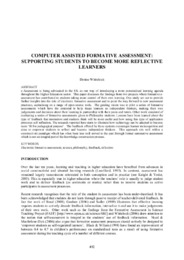Computer assisted formative assessment: supporting students to become more reflective Learners
Abstract
e-Assessment is being advocated in the UK as our way of introducing a more personalised learning agenda
throughout the Higher Education sector. This paper discusses the findings from two projects where formative eassessment
has contributed to students taking more control of their own learning. One study set out to provide
further insights into the role of electronic formative assessment and to point the way forward to new assessment
practices, capitalising on a range of open source tools. The guiding vision was to pilot a series of formative
assessments which have the potential to help shape learners as independent thinkers, making their own
judgements and decisions about their learning in partnership with their peers and tutors. Other work consisted of
evaluating a series of formative assessments given to Philosophy students. Lessons have been learned about the
type of feedback that instructors and students think will be most useful and how using this type of application
promotes self reflection. The research reported here starts to illustrate how technology can be adapted to become
more ‘fit for pedagogical purpose’. The feedback offered by these systems encourages learner metacognition and
aims to empower students to reflect and become independent thinkers. This approach sits well within a
constructivist paradigm which has often been less well served in the past through formal summative assessment
which is not an integral part of the knowledge construction process.
